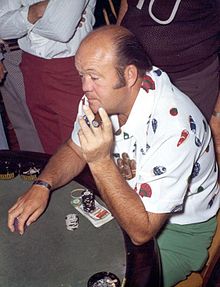Puggy Pearson
| Puggy Pearson | |
|---|---|
 Puggy Pearson in the 1974 World Series of Poker | |
| Nickname(s) | Puggy |
| Residence | Las Vegas, Nevada |
| World Series of Poker | |
| Bracelet(s) | 4 |
| Money finish(es) | 7 |
| Highest ITM Main Event finish | Winner, 1973 |
Walter Clyde Pearson (January 29, 1929 in Tennessee – April 12, 2006) was an American professional poker player.
Pearson grew up in Tennessee in a large family with nine siblings. He got his nickname "Puggy" from a childhood accident that left him with a disfigured nose at the age of 12. He dropped out of school in the 5th grade, and at the age of 17 he joined the United States Navy, where he served three terms. Already known as one of the best pool players in the world, he cut his teeth at poker and gambling while in the service.
Prior to 1949, all poker games were cash games; a player could cash out his chips and leave at any time. Pearson originated the idea of a freezeout tournament and shared his idea with fellow gambler "Nick the Greek" Dandolos. Dandalos later brought the idea to legendary casino owner Benny Binion, who in turn founded the World Series of Poker.
Pearson won the 1973 World Series of Poker (WSOP) main event when his A♠ 7♠ defeated Johnny Moss's K♥ J♠. He has a total of 4 WSOP bracelets (two of which were in seven-card stud, which was considered his best game.)
Pearson was inducted into the Poker Hall of Fame in 1987.
World Series of Poker Bracelets
| Year | Tournament | Prize (US$) |
|---|---|---|
| 1971 | Limit Seven Card Stud | $10,000 |
| 1973 | $10,000 No Limit Hold'em World Championship | $130,000 |
| 1973 | $1,000 No Limit Hold'em | $17,000 |
| 1973 | $4,000 Limit Seven Card Stud | $32,000 |
Trivia
This article contains a list of miscellaneous information. (June 2007) |
- Pearson was also a keen golfer, who played at scratch. (Doyle "Texas Dolly" Brunson considered him to be a better pressure putter than Jack Nicklaus, Ben Crenshaw and Tom Watson.)
- Pearson regularly played whilst smoking a cigar.
- Pearson was the only poker player to attend every WSOP from 1970 to 2005.[citation needed]
- Pearson once threw cards at a dealer, who responded by hitting him on the head with her high heels while another dealer held him down. On another occasion, Pearson urinated on a dealer, which was confirmed by Mike Caro in the Usenet group rec.gambling.poker. [1] Other poker players, however, describe his general demeanor as laid back; Amarillo Slim said Pearson was "softer than butter on a hot stove".
- Pearson bought a tour bus with "Puggy Pearson - Roving Gambler" painted on it. Underneath was written the challenge "I'll play any man from any land any game he can name for any amount I can count." Further below (in smaller writing) was written "Provided I like it."
Famous Quotes
"A gambler's ace is his ability to think clearly under stress. That's very important, because, you see, fear is the basis of basis of all mankind. In cards, you psyche 'em out, you shark 'em, you put the fear of God in 'em. That's life. Everything's mental in life. The butt was made to lug the mind around. The most important thing in gamblin' is knowing the sixty-forty end of the proposition and knowing the human element. Some folks may know one of 'em, but ain't many know 'em both. I believe in logics. Cut and dried. Two and two ain't nothing in the world but four. But them suckers always think it's somethin' different... I play percentages in everything. Now, knowing the percentages perfectly, the kind of numbers you read in books, is all right, but the hidden percentages are more important. The real thing to know is that folks will stand to lose more than they will to win. That's the most important percentage there is. I mean, if they lose, they're willing to lose everything. If they win, they're usually satisfied to win enough to pay for dinner and a show. The best gamblers know that."[1]
Notes
- ^ Alvarez, A. (2004). Poker Bets, Bluffs and Bad Beats. San Francisco: First Chronicle Books LLC.
External links
- Articles with trivia sections from June 2007
- Articles needing cleanup from February 2007
- Cleanup tagged articles without a reason field from February 2007
- Wikipedia pages needing cleanup from February 2007
- 1929 births
- 2006 deaths
- American gin players
- American poker players
- American pool players
- United States Navy sailors
- World Series of Poker Main Event winners
- World Series of Poker bracelet winners
